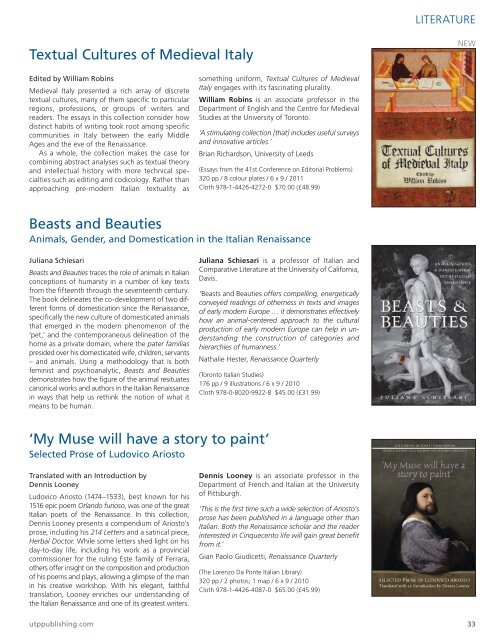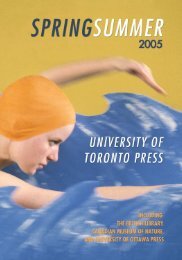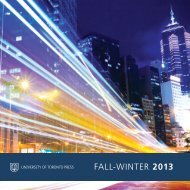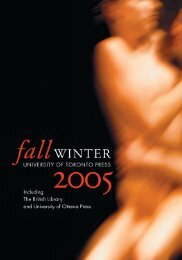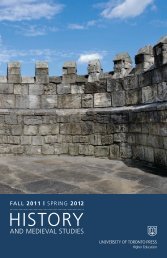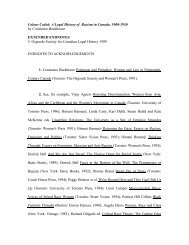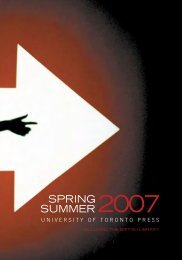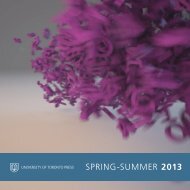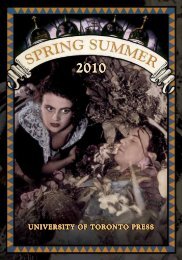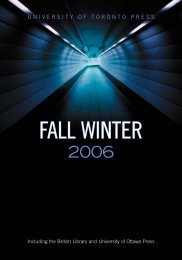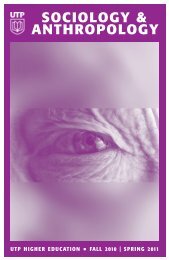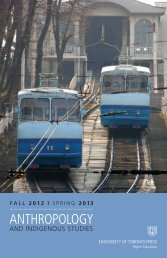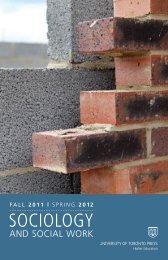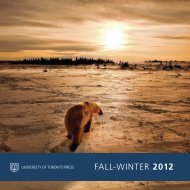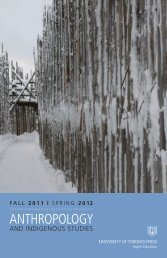Classics, Medieval & Renaissance 2012 - University of Toronto ...
Classics, Medieval & Renaissance 2012 - University of Toronto ...
Classics, Medieval & Renaissance 2012 - University of Toronto ...
Create successful ePaper yourself
Turn your PDF publications into a flip-book with our unique Google optimized e-Paper software.
LITERATURE<br />
Textual Cultures <strong>of</strong> <strong>Medieval</strong> Italy<br />
NEW<br />
Edited by William Robins<br />
<strong>Medieval</strong> Italy presented a rich array <strong>of</strong> discrete<br />
textual cultures, many <strong>of</strong> them specific to particular<br />
regions, pr<strong>of</strong>essions, or groups <strong>of</strong> writers and<br />
readers. The essays in this collection consider how<br />
distinct habits <strong>of</strong> writing took root among specific<br />
communities in Italy between the early Middle<br />
Ages and the eve <strong>of</strong> the <strong>Renaissance</strong>.<br />
As a whole, the collection makes the case for<br />
combining abstract analyses such as textual theory<br />
and intellectual history with more technical specialties<br />
such as editing and codicology. Rather than<br />
approaching pre-modern Italian textuality as<br />
something uniform, Textual Cultures <strong>of</strong> <strong>Medieval</strong><br />
Italy engages with its fascinating plurality.<br />
William Robins is an associate pr<strong>of</strong>essor in the<br />
Department <strong>of</strong> English and the Centre for <strong>Medieval</strong><br />
Studies at the <strong>University</strong> <strong>of</strong> <strong>Toronto</strong>.<br />
‘A stimulating collection [that] includes useful surveys<br />
and innovative articles.’<br />
Brian Richardson, <strong>University</strong> <strong>of</strong> Leeds<br />
(Essays from the 41st Conference on Editorial Problems)<br />
320 pp / 8 colour plates / 6 x 9 / 2011<br />
Cloth 978-1-4426-4272-0 $70.00 (£48.99)<br />
Beasts and Beauties<br />
Animals, Gender, and Domestication in the Italian <strong>Renaissance</strong><br />
Juliana Schiesari<br />
Beasts and Beauties traces the role <strong>of</strong> animals in Italian<br />
conceptions <strong>of</strong> humanity in a number <strong>of</strong> key texts<br />
from the fifteenth through the seventeenth century.<br />
The book delineates the co-development <strong>of</strong> two different<br />
forms <strong>of</strong> domestication since the <strong>Renaissance</strong>,<br />
specifically the new culture <strong>of</strong> domesticated animals<br />
that emerged in the modern phenomenon <strong>of</strong> the<br />
‘pet,’ and the contemporaneous delineation <strong>of</strong> the<br />
home as a private domain, where the pater familias<br />
presided over his domesticated wife, children, servants<br />
– and animals. Using a methodology that is both<br />
feminist and psychoanalytic, Beasts and Beauties<br />
demonstrates how the figure <strong>of</strong> the animal resituates<br />
canonical works and authors in the Italian <strong>Renaissance</strong><br />
in ways that help us rethink the notion <strong>of</strong> what it<br />
means to be human.<br />
Juliana Schiesari is a pr<strong>of</strong>essor <strong>of</strong> Italian and<br />
Comparative Literature at the <strong>University</strong> <strong>of</strong> California,<br />
Davis.<br />
‘Beasts and Beauties <strong>of</strong>fers compelling, energetically<br />
conveyed readings <strong>of</strong> otherness in texts and images<br />
<strong>of</strong> early modern Europe … it demonstrates effectively<br />
how an animal-centered approach to the cultural<br />
production <strong>of</strong> early modern Europe can help in understanding<br />
the construction <strong>of</strong> categories and<br />
hierarchies <strong>of</strong> humanness.’<br />
Nathalie Hester, <strong>Renaissance</strong> Quarterly<br />
(<strong>Toronto</strong> Italian Studies)<br />
176 pp / 9 illustrations / 6 x 9 / 2010<br />
Cloth 978-0-8020-9922-8 $45.00 (£31.99)<br />
‘My Muse will have a story to paint’<br />
dennis looney is an associate pr<strong>of</strong>essor in the<br />
Selected Prose <strong>of</strong> Ludovico Ariosto<br />
Translated with an Introduction by<br />
Dennis Looney<br />
Ludovico Ariosto (1474–1533), best known for his<br />
1516 epic poem Orlando furioso, was one <strong>of</strong> the great<br />
Italian poets <strong>of</strong> the <strong>Renaissance</strong>. In this collection,<br />
Dennis Looney presents a compendium <strong>of</strong> Ariosto’s<br />
prose, including his 214 Letters and a satirical piece,<br />
Herbal Doctor. While some letters shed light on his<br />
day-to-day life, including his work as a provincial<br />
commissioner for the ruling Este family <strong>of</strong> Ferrara,<br />
others <strong>of</strong>fer insight on the composition and production<br />
<strong>of</strong> his poems and plays, allowing a glimpse <strong>of</strong> the man<br />
in his creative workshop. With his elegant, faithful<br />
translation, Looney enriches our understanding <strong>of</strong><br />
the Italian <strong>Renaissance</strong> and one <strong>of</strong> its greatest writers.<br />
Department <strong>of</strong> French and Italian at the <strong>University</strong><br />
<strong>of</strong> Pittsburgh.<br />
The lorenzo Da Ponte Italian Library<br />
‘We have no Empire, such as did the Romans, so powerful that<br />
subject cities spontaneously sought to emulate their rulers’ speech ...<br />
Nonetheless it can clearly be seen how, in our present times, many<br />
diverse people <strong>of</strong> intelligence and refinement, outside Italy no less<br />
than within Italy, devote much effort and study to learning and<br />
Dennis Looney is associate pr<strong>of</strong>essor in the<br />
speaking our language for no other reason than love.’<br />
– Giovan Batista Gelli, Ragionamento sulla lingua, 1551<br />
Department <strong>of</strong> French and Italian at the <strong>University</strong><br />
<strong>of</strong> Pittsburgh.<br />
‘This is the first time such a wide selection <strong>of</strong> Ariosto’s<br />
prose has been published in a language other than<br />
Italian. Both the <strong>Renaissance</strong> scholar and the reader<br />
interested in Cinquecento<br />
‘This volume,<br />
life<br />
containing<br />
will<br />
the largest<br />
gain<br />
selection<br />
great<br />
<strong>of</strong> Ariosto’s prose<br />
benefit<br />
translated into any language, is truly commendable.<br />
from it.’<br />
Dennis Looney’s precise, elegant interpretation is enhanced by a<br />
rich historical foreword and a well-assembled bibliography.<br />
Both general readers and scholars will appreciate this valuable<br />
Gian Paolo Giudicetti, <strong>Renaissance</strong><br />
resource for defining Ariosto’s<br />
Quarterly<br />
life and time.’<br />
Jacket illustrations: (front) Portrait <strong>of</strong> a Man, c.1512 (oil on canvas), Titian<br />
(Tiziano Vecellio) (c.1488–1576), National Gallery, London, UK / The<br />
Bridgeman Art Library International; (back) Letter 5, Archivio di Stato,<br />
Modena, Archivio Segreto Estense, Cancelleria Estero, Serie: Ambasciatori,<br />
agenti e corrispondenti all’estero, Italia, Roma, 131, Ludovico Ariosto,<br />
Dispaccio, 1509, 25 dic. Busta 20. Thanks to Director Euride Fregni for<br />
permission to reproduce the image (Prot. 1420/28.01.02/1.2).<br />
<strong>University</strong> <strong>of</strong> <strong>Toronto</strong> Press<br />
Jacket printed in Canada<br />
ISBN 978-1-4426-4087-0<br />
Roberto Fedi, Università per Stranieri di Perugia<br />
(The Lorenzo Da Ponte Italian Library)<br />
ISBN 978-1-4426-4087-0<br />
320 pp / 2 photos; 1 map ,!7IB4E2-geaiha! / 6 x 9 / 2010<br />
Cloth 978-1-4426-4087-0 $65.00 (£45.99)<br />
unIversITy oF ToronTo Press<br />
www.utppublishing.com<br />
lorenzo<br />
da ponte<br />
italian<br />
library<br />
Looney<br />
The Lorenzo Da PonTe ITaLIan LIbrary<br />
GeneraL eDITors: LuIGI baLLerInI anD MassIMo CIavoLeLLa<br />
‘My<br />
T<br />
Ludovi<br />
1516 ep<br />
Italian<br />
Dennis<br />
prose, i<br />
Herbal<br />
Ario<br />
<strong>of</strong> the w<br />
letters<br />
his wor<br />
ing Este<br />
compos<br />
allowin<br />
shop. H<br />
and Ne<br />
a defen<br />
philolo<br />
differen<br />
With<br />
provide<br />
Ariosto<br />
Italian R<br />
(The Lo<br />
utppublishing.com 33


